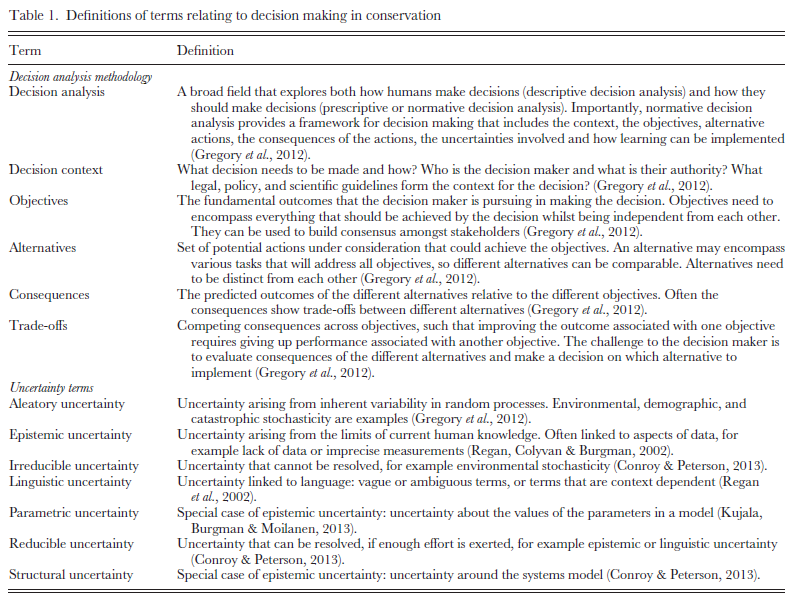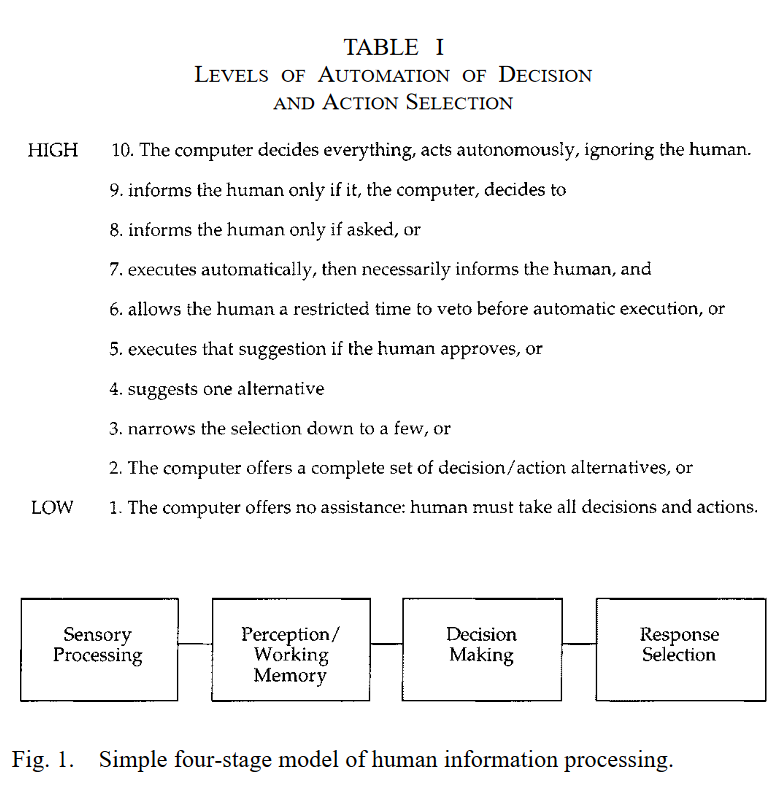Decision Making
Decision making is a more general form of Design.
Cf.
Importance
In novel environments such as the Anthropocene, established behaviours or forms of path selection that depend on highly specific past patterns can fail. It is necessary to be able to judge novel alternatives.
Definitions
Most general definitions across domain would come from systems theory.
Decision making is a process through which a system (such as an organism, a machine, an ecological or social system) changes its state/behaviour in response to information or feedback from its environment, often to maintain the system's core structures.
Decision-making is a conserved evolutionary process enabling organisms to choose one option among several alternatives through reliance on reward and cognitive control systems.
Cabeza, Lidia, Julie Giustiniani, Thibault Chabin, Bahrie Ramadan, Coralie Joucla, Magali Nicolier, Lionel Pazart, et al. ‘Modelling Decision-Making Under Uncertainty: A Direct Comparison Study Between Human and Mouse Gambling Data’. European Neuropsychopharmacology 31 (2020): 58–68. https://doi.org/10/gr9j4s.
Cf.
- general systems theory, systems thinking
- decision science
- cognition in the wild
- decision-making ecologies (transfer of evidence-based solutions between places and cultures, etc.)
- choice-relevant information
- risk attitudes
- rationality (in economics, biology, etc.). A behaviour is rational if enables maximisation of some form of currency, resulting in internally consistent decisions

Bolam, Friederike C., Matthew J. Grainger, Kerrie L. Mengersen, Gavin B. Stewart, William J. Sutherland, Michael C. Runge, and Philip J. K. McGowan. ‘Using the Value of Information to Improve Conservation Decision Making’. Biological Reviews 94, no. 2 (2019): 629–47. https://doi.org/10/ggj76h.
On the impossibility of avoiding decisions:
Allison, Stuart K. ‘You Can’t Not Choose: Embracing the Role of Choice in Ecological Restoration’. Restoration Ecology 15, no. 4 (2007): 601–5. https://doi.org/10/fjxn7h.
Decisions and Living Systems
"Life is matter that chooses", Margulis, Lynn, and Dorion Sagan. What Is Life? 1995. Reprint, Berkeley: University of California Press, 2000, p. 226.
Cognition is action based on sensory information (that is - also a type of decision). Shapiro
Samuel Butler (1835-1902): sentient life is making numberless tiny decisions and is responsible in part for its evolution. Amoebas have wants, tools to change their environments, and goals.
Butler, Samuel. Evolution, Old and New ; or, the Theories of Buffon, Dr. Erasmus Darwin, and Lamarck, as Compared with That of Mr. Charles Darwin. New York: E. P. Dutton and Company, 1882.
Butler, Samuel. Life and Habit. London: Jonathan Cape, 1878.
Decision-making occurs at the spatially smallest levels (cells) and largest (Gaia) 1.
Cells
Perkins, Theodore J., and Peter S. Swain. ‘Strategies for Cellular Decision‐Making’. Molecular Systems Biology 5, no. 1 (2009): 326. https://doi.org/10.1038/msb.2009.83.
Value of Decisions
Decisions are good when they achieve what is of Value (what is value, to whom and how?).
Pragmatically, a better decision is the one that will work out OK in a broader range of alternative scenarios.
Cf. robust decision-making.
Marchau, Vincent A. W. J., Warren E. Walker, Pieter J. T. M. Bloemen, and Steven W. Popper, eds. Decision Making under Deep Uncertainty: From Theory to Practice. Cham: Springer, 2019.
Examples
Provide examples and discuss differences emphasising the mutualistic nature of all decisions.
Relationship to Other Mechanisms
In biological systems, the ability to make decisions is one of many strategies that result in fitness, wellbeing, etc.
They include:
- Instinct that does not require decisions by an individual because the responses are the same for all members of a species.
- Imitation can complement decision-making, for example when an observed behaviour leads to success.
- Trial-and-error strategies lead to an acceptable outcomes from multiple attempts. Can support future decisions by providing data on the outcomes of choices.
- Habituation and sensitisation can compete with decisions because the response can be automatic.
- Cooperative behaviour can be understood as collective decisions and such decisions can contradict the decisions by individuals.
- Altruism and reciprocity involve actions that anticipate future returns (reciprocal altruism) and sharing of genes (kin selection). These mechanisms can extend the range of decisions.
- Social hierarchy and dominance result in some in individuals and groups making decisions on behalf of others.
Challenges, Questions, and Directions
- what are the sources of information for more-than-human decision making? What are the boundaries to such sources in comparison to human-oriented data? 2
Points
- decisions are mutualistic, shared, hybrid
- all life makes decisions (cf., bacteria, slime mould, fungi, plants, animals, humans)
- emerging AI and computing systems make decisions
- decision-making is continuous 3
Cf. neurobiology of decision making and the naturalised understanding of the human mind.
Skov, Martin, and Marcos Nadal. ‘Art Is Not Special: An Assault on the Last Lines of Defense Against the Naturalization of the Human Mind’. Reviews in the Neurosciences 29, no. 6 (2018): 699–702. https://doi.org/10/gcwvhk.
Politics/Policy of Decision-Making
Deliberative vs agonistic. Decision-making is always a step that limits the number of open options, resulting in a loss of choices, risk, etc.
Mouffe, Chantal. ‘Democracy or Agonistic Pluralism?’ Social Research 66, no. 3 (1999): 745–58.
Ruggeri, Kai, ed. Psychology and Behavioral Economics: Applications for Public Policy. 2nd ed. 2019. Reprint, Abingdon: Routledge, 2022.
Nonhuman Decision-Making
All beings have to make decisions, or act based on the incoming information, in according to their interpretation of the signals and their models of the world.
For a research topic in Frontiers, see: An Ecological Perspective on Decision-Making: Empirical and Theoretical Studies in Natural and Natural-Like Environments
Cf.:
- decision-making under the risk of predation
- migration strategies
Budaev, Sergey, Christian Jørgensen, Marc Mangel, Sigrunn Eliassen, and Jarl Giske. ‘Decision-Making From the Animal Perspective: Bridging Ecology and Subjective Cognition’. Frontiers in Ecology and Evolution 7 (2019). https://doi.org/10/gp4tvv.
An example of a thought experiment about the world of dogs without humans.
Pierce, Jessica, and Marc Bekoff. A Dog’s World: Imagining the Lives of Dogs in a World Without Humans. Princeton: Princeton University Press, 2021.
A theory of biological decision making that applies to all “brainy animals”.
Hardy-Vallée, Benoit. ‘Decision Making in the Economy of Nature: Value as Information’. In Information and Living Systems: Philosophical and Scientific Perspectives, edited by George Terzis and Robert Arp, 253–87. Cambridge, MA: MIT Press, 2011.
In plants, much of decision-making takes place underground cf. 'root-brain'.
Calvo Garzón, Paco, and Fred Keijzer. ‘Plants: Adaptive Behavior, Root-Brains, and Minimal Cognition’. Adaptive Behavior 19, no. 3 (2011): 155–71. https://doi.org/10/dnvszn.
Decision-Making and the More-than-Human World
Edelblutte, Émilie, Roopa Krithivasan, and Matthew Nassif Hayek. ‘Animal Agency in Wildlife Conservation and Management’. Conservation Biology, 2022, e13853. https://doi.org/10/gqkjfs.
Artificial Systems and Decision Making (Automation)

Parasuraman, Raja, Thomas B. Sheridan, and Christopher D. Wickens. ‘A Model for Types and Levels of Human Interaction with Automation’. IEEE Transactions on Systems, Man, and Cybernetics - Part A: Systems and Humans 30, no. 3 (2000): 286–97. https://doi.org/10/c6zf92.
Other references:
Duan, Yanqing, John S. Edwards, and Yogesh K Dwivedi. ‘Artificial Intelligence for Decision Making in the Era of Big Data – Evolution, Challenges and Research Agenda’. International Journal of Information Management 48 (2019): 63–71. https://doi.org/10/gfxhph.
Mahmud, Hasan, A. K. M. Najmul Islam, Syed Ishtiaque Ahmed, and Kari Smolander. ‘What Influences Algorithmic Decision-Making? A Systematic Literature Review on Algorithm Aversion’. Technological Forecasting and Social Change 175 (2022): 121390. https://doi.org/10/gntds4.
Pietronudo, Maria Cristina, Grégoire Croidieu, and Francesco Schiavone. ‘A Solution Looking for Problems? A Systematic Literature Review of the Rationalizing Influence of Artificial Intelligence on Decision-Making in Innovation Management’. Technological Forecasting and Social Change 182 (2022): 121828. https://doi.org/10/gq6b7h.
Xiong, Wei, Hongmiao Fan, Liang Ma, and Chen Wang. ‘Challenges of Human—Machine Collaboration in Risky Decision-Making’. Frontiers of Engineering Management 9, no. 1 (2022): 89–103. https://doi.org/10/gp2mx8.
Janssen, Marijn, Martijn Hartog, Ricardo Matheus, Aaron Yi Ding, and George Kuk. ‘Will Algorithms Blind People? The Effect of Explainable AI and Decision-Makers’ Experience on AI-Supported Decision-Making in Government’. Social Science Computer Review 40, no. 2 (2022): 478–93. https://doi.org/10/gjnbgn.
Angerschmid, Alessa, Jianlong Zhou, Kevin Theuermann, Fang Chen, and Andreas Holzinger. ‘Fairness and Explanation in AI-Informed Decision Making’. Machine Learning and Knowledge Extraction 4, no. 2 (2022): 556–79. https://doi.org/10/gr9j5d.
Link this to more-than-human social conception Bokhari, Syed Asad A., and Seunghwan Myeong. ‘Use of Artificial Intelligence in Smart Cities for Smart Decision-Making: A Social Innovation Perspective’. Sustainability 14, no. 2 (2022): 620. https://doi.org/10/gr9j5f.
In Design
To illustrate the current approaches:
Lee, Ju Hyun, and Michael J. Ostwald. ‘Creative Decision-Making Processes in Parametric Design’. Buildings 10, no. 12 (2020): 242. https://doi.org/10/gmm8vk.
Hybrid and Collaborative Systems
- Improvement and optimisation of existing ways to make human decisions
- Collaborative and decision support systems (medicine, management)
- Supplementation and replacement (high-frequency trading)
- Autonomous systems (cars, drones)
- Mimicking biological decisions to advance understanding of decision-making in complex systems
Relevant Sources
References
King, Mervyn, and John Kay. Radical Uncertainty: Decision-Making for an Unknowable Future. London: The Bridge Street Press, 2020.
Footnotes
Rubin, Sergio, Tomas Veloz, and Pedro Maldonado. ‘Beyond Planetary-Scale Feedback Self-Regulation: Gaia as an Autopoietic System’. Biosystems 199 (2021): 104314. https://doi.org/10/gkscxw.˄
Yoo, Seng Bum Michael, Benjamin Yost Hayden, and John M. Pearson. ‘Continuous Decisions’. Philosophical Transactions of the Royal Society B: Biological Sciences 376, no. 1819 (2021): 20190664. https://doi.org/10/gh3zd9.˄
Khan, Asharul Islam, and Ali Al-Badi. ‘Emerging Data Sources in Decision Making and AI’. Procedia Computer Science 177 (2020): 318–23. https://doi.org/10/gr9j5h.˄
Backlinks